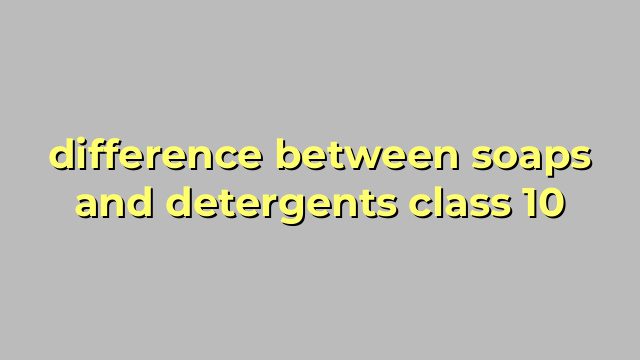The Difference Between Soaps And Detergents: Understanding The Basics
What Are Soaps And Detergents?
Soaps and detergents are commonly used for cleaning tasks. They are available in various forms and used for different purposes, ranging from personal hygiene to industrial applications. Both of these cleaning agents are quite useful to maintain cleanliness in our daily life, but their composition and properties make them unique from each other.
Soaps and detergents both have a common cleaning mechanism. They have the ability to dissolve impurities and remove dirt from the surfaces, but their way of action differs.
Soaps
Soaps are derived naturally from fats and oils, and the entire soap-making process is known as saponification, which involves heating fats or oils with an alkali like sodium hydroxide. The chemical reaction produces soap molecules and glycerin, a co-product. Soaps are biodegradable and eco-friendly.
Soaps are more suitable for cleaning delicate fabrics such as silk, woolens, etc. They have anionic properties and remain stable in soft water. However, due to their ionic nature, they can react with minerals present in hard water to form scum, which then reduces their effectiveness.
Detergents
Detergents are synthetic compounds made from petrochemicals that have strong cleaning properties. They are much more resistant to hard water than soaps and work effectively in both hard and soft water. Detergents are also more appropriate for cleaning synthetic fabrics like polyester, nylon, etc.
Detergents have surfactant properties, meaning they have a hydrophilic head and a hydrophobic tail. This enables them to form micelles in water, which dissolve and suspend the dirt particles.
Difference Between Soaps And Detergents
The primary difference between soaps and detergents is their chemical composition. Soaps are made from natural ingredients, while detergents are synthetic. Soaps are biodegradable and eco-friendly, but they are not effective in hard water, and they can react with minerals to form scum.
Detergents, on the other hand, are more effective in cleaning and work well in hard water. They are also better at removing tough stains and grease from fabrics. However, detergents are not eco-friendly and can have adverse effects on the environment.
Conclusion
Soaps and detergents both have unique properties that make them useful for different cleaning tasks. Soaps are natural and eco-friendly but not very effective in hard water, while detergents are synthetic and better at cleaning tough stains but can have adverse effects on the environment. Understanding the difference between soaps and detergents can help us choose the right cleaning agent for our specific needs.
Table difference between soaps and detergents class 10
Difference between Soap and Detergent
| Feature | Soap | Detergent |
|---|---|---|
| Composition | Generally made from natural ingredients such as animal fats or plant oils | Usually made from synthetic ingredients |
| Effectiveness in hard water | Less effective | More effective |
| Formation of lather | Forms lather in soft water | Forms lather in both soft and hard water |
| Biodegradability | More biodegradable | Less biodegradable |
| Effect on fabric colours | Can cause fading of bright colours | Does not have adverse effect on colours |


